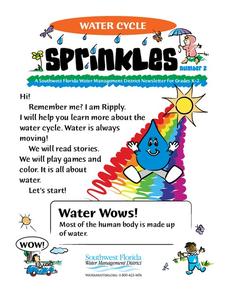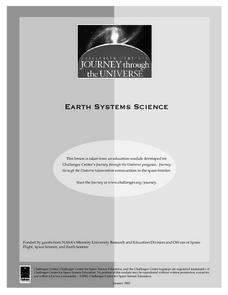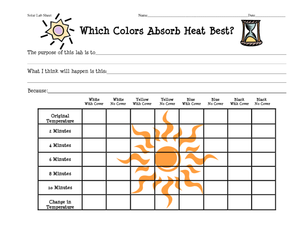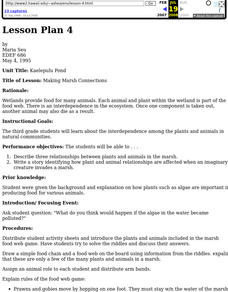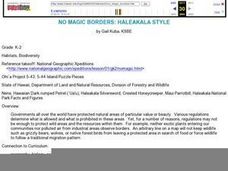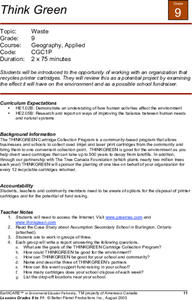Curated OER
Specialty Crop Production/Orchids
Twelfth graders explore the fascinating world of orchid production including propagation, care, culture, and finishing. They complete market research and design a production schedule for an orchid crop of their choice. They write a short...
Curated OER
Cell Study
Students (females) are introduced to the cell. They discuss what a cell is, and students define what a cell is. Students comprehend that all living things are made up of cells. They comprehend that life is defined as something that...
Curated OER
Sunlight and Warm Air
Young scholars examine the different ways heat can be felt. In this radiation and conduction instructional activity, students recognize that the sun radiates heat. Young scholars conduct three experiments to find how the sun warms...
Curated OER
Sprinkles
In this science worksheet, students read a water trip rebus. Pictures replace several of the words in the article. They color a picture of the water cycle and add arrows to show the direction the water is moving. Students draw a picture...
Curated OER
Water Power
Students observe a model of a waterwheel to investigate the transformations of energy involved in turning the blades of a hydro-turbine into work. They work as engineers to create a model for a new waterwheel while considering resources,...
Curated OER
Plate Tectonics: Movin' and Shakin'
Students are introduced to the causes of plate movements and the hazards they present. They plot the location of 50 earthquakes and 50 volcanic eruptions on a map and explore the relationships between plate tectonics, earthquakes, and...
Curated OER
Compost in a Bag!
Fourth graders experiment to see which objects decompose. In this compost lesson, 4th graders observe the changes of labeled objects in a bag. Leave the objects for one month and record the changes by observation and weight. Students...
Curated OER
Fossil Formation Fun
Students compare the three types of fossils: preserved organisms, mineral replacement fossils, and impression fossils. They create a model of amber,
sponge fossil, and make traces of fossil.
Curated OER
What Happens to a Seed?
In this creative instructional activity on seeds, 1st graders listen as the book The Tiny Seed by Eric Carle is read to them about the life of a seed. Students then draw a picture to show the life cycle of a seed in each season.
Curated OER
Photosynthesis
Students investigate photosynthesis in water plants. In this photosynthesis lesson plan, students use the elodea plant and observe gas bubbles released to determine the rate of photosynthesis. They vary the light intensity and the amount...
Curated OER
Deep Jungle: New Frontiers
Students watch a series of videos and observe the different plants and animals found in the rainforests. For this ecology lesson, students discuss how technology helped scientists study the jungle. They create 3D maps of Borneo rainforests.
Curated OER
Cooking with the Sun!
Learners access prior knowledge of solar energy and understand that solar energy produces heat. In this solar cooker lesson, students complete grade appropriate experiments using the heat of the sun. Learners complete a worksheet on...
Curated OER
Baa, Ram, Ewe....Sheep Tales
Students compare real and make believe animal behaviors by drawing and comparing them. In this real and make believe animals lesson plan, students compare the animal behaviors, express how colors create a mood in artwork, and investigate...
Curated OER
How Does Chance Influence Inheritance?
Students complete a lab based on how chance affects which genes appear in gametes as in Mendel's Law of Segregation. They review the theories, vocabulary words, and historical background of Gregor Mendel's work with pea plants. They...
Curated OER
How Groundhog's Garden Grew
Students answer questions based on Bloom's Taxonomy after reading the book, How Groundhog's Garden Grew, by Lynne Cherry. In this reading comprehension lesson, students respond to 6 questions, one per taxonomy level, to...
Curated OER
Life Cycle: Diversity in a Balance
In this life cycle workbook, 3rd graders complete several different activities in which they analyze different invertebrates, identify arthropods, examine human biology and plants, and study natural environments. 20 different activities...
Curated OER
Making Marsh Connections
Third graders explore the interdependence among the plants and animals in natural communities.
Curated OER
Forest Ecosystem Field Trip
Students investigate the environment by participating in a class field trip. In this botany lesson plan, students attend a field trip through their local park or forest while listening to a nature guide. Students practice using their 5...
Curated OER
No Magic Borders: Haleakala Style
Students discuss borders and boundaries. They discuss pollution and the fact that boundaries cannot stop pollution and that pollution affects even protected wildlife and plants. They participate in an activity in which they must place...
Curated OER
Bugs in the Woods
Second graders identify insects and plants in the forest ecosystem in a structured field trip with stations and activity booklets. In this bugs lesson, 2nd graders explore the ecosystem of the forest, complete the booklet and play...
Curated OER
Think Green
THINKGREEN has a computer printer cartridge collection program. After reading the story of how Assumption Secondary School in Burlington, Ontario started participating in the THINKGREEN recycling program, pupils work in groups of...
Curated OER
Butterfly Lifecycles
What a great way to present this topic! While a little difficult to follow, this lesson provides great ideas for a second grade lesson involving butterfly lifecycles. Learners make drawings of butterflies, discuss life cycles, and write...
Curated OER
Constitution/Deer Valley
Students mount plant samples of the school community. They take samples, mount and identify. Students place cardstock on a piece of cardboard. They glue label in a corner. Students position dried plants on cardstock the way they were...
Curated OER
Ph-ocusing on Photosynthesis In and Out of the Garden
Pupils are introduced to the concept of photosynthesis. As a class, they brainstorm a list of what they already know about plants and individually grow a plant on their own in the classroom. They record their observations daily and...



